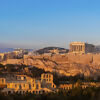9 Nights | Europe
About Heraklion, Greece
You will visit the following 5 places:

Heraklion
Heraklion is the largest city and the administrative capital of the island of Crete. It is the fourth largest city in Greece. The Bronze Age palace of Knossos, also known as the Palace of Minos, is located nearby. Heraklion is close to the ruins of the palace of Knossos, which in Minoan times was the largest centre of population on Crete. Though there is no archaeological evidence of it, Knossos may well have had a port at the site of Heraklion as early as 2000 BC. Around the city can be found several sculptures, statues and busts commemorating significant events and figures of the city's and island's history, like El Greco, Vitsentzos Kornaros, Nikos Kazantzakis and Eleftherios Venizelos.

Haifa International Airport
Haifa is the third-largest city in the State of Israel. It is home to the Bahá'í World Centre, a UNESCO World Heritage Site and a destination for Baha'i pilgrims. Built on the slopes of Mount Carmel, the settlement has a history spanning more than 3,000 years. The earliest known settlement in the vicinity was Tell Abu Hawam, a small port city established in the Late Bronze Age (14th century BCE). In the 3rd century CE, Haifa was known as a dye-making center. Today, the city is a major seaport located on Israel's Mediterranean coastline in the Bay of Haifa covering 63.7 square kilometres (24.6 sq mi). The city plays an important role in Israel's economy. It is also home to Matam, one of the oldest and largest high-tech parks in the country. Haifa Bay is a center of heavy industry, petroleum refining and chemical processing. Haifa formerly functioned as the western terminus of an oil pipeline from Iraq via Jordan.

Athens
Athens is the capital and largest city of Greece. Athens dominates the Attica periphery and it is one of the world's oldest cities, as its recorded history spans around 3,400 years. The city is widely referred to as the cradle of Western civilization and the birthplace of democracy, largely because of its cultural and political impact on the European continent and in particular the Romans. In modern times, Athens is a large cosmopolitan metropolis and central to economic, financial, industrial, maritime, political and cultural life in Greece. Its compact downtown, north of campus, is alive with clubs, bars, restaurants, galleries and – of course – record stores; Broad Street in particular is lined with arty shops.

Limassol District











